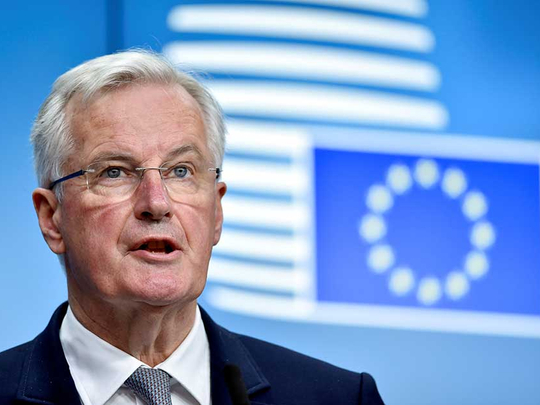
London: The EU will force a humiliated Theresa May to explain her intentions at a face-to-face meeting in Brussels as senior diplomats and politicians warned the hung parliament resulting from the UK election was an “own goal” and a “disaster” that hugely increases the chance of Brexit talks breaking down.
The result is likely to delay the point at which Michel Barnier, the EU’s chief negotiator, has someone with whom to negotiate.
Sources said a meeting of the European council on 22 June was the deadline by which time the EU27 would want to know the prime minister’s plans.
Guy Verhofstadt, the European parliament’s Brexit representative, tweeted: “Yet another own goal, after Cameron now May, will make already complex negotiations even more complicated.”
Guenther Oettinger, the German member of the European Commission, said: “We need a government that can act. With a weak negotiating partner, there’s the danger than the negotiations will turn out badly for both sides ... I expect more uncertainty now.”
It had been hoped that officials from both sides would have informal talks next week over the logistics of the negotiations, before formal talks began on the week starting 19 June.
With the prime minister needing to both seek to form a minority or coalition government, as well as potentially revise her goals for the talks in the light of the election result, the original timetable seems unrealistic to officials in Brussels.
The EU had, until now, believed it understood that May wanted to take the UK out of both the single market and the customs union, but in the early hours of Friday morning the Brexit secretary, David Davis, suggested the election result could prompt a rethink.
Davis said of the Tory’s manifesto pledges on the single market and customs union: “That’s what it [the election] was about, that’s what we put in front of the people, we’ll see tomorrow whether they’ve accepted that or not. That will be their decision.”
One senior diplomat said of Friday morning’s result: “We want a deal. We are professionals, we have a mandate to get a deal, and we want a deal more than anyone. But we don’t even know who we are negotiating with.”
Barnier indicated the remaining 27 members were prepared to be flexible when the process begins.
“Brexit negotiations should start when UK is ready; timetable and EU positions are clear. Let’s put our minds together on striking a deal,” the Frenchman said on Twitter.
Barnier had previously set a timetable of talks starting in the week beginning June 19, with agreement on initial issues by autumn of this year and a provisional Brexit deal in October 2018.
Britain is set to leave the EU at the end of March 2019 after May triggered the formal two-year divorce process on March 29 of this year.
Manfred Weber, the head of the European Parliament’s largest group and a key ally of German Chancellor Angela Merkel, said May had caused “chaos”.
“EU is united, UK is deeply split. PM May wanted stability but brought chaos to her country instead,” tweeted Weber, who leads the centre-right European People’s Party.
“The clock is ticking for Brexit. Therefore the UK needs a government soon. The date for the beginning of negotiations is now unclear.”
European Parliament Brexit pointsman Guy Verhofstadt compared the British outcome to former British prime minister David Cameron’s ill-fated decision to call last year’s Brexit referendum.
“Yet another own goal, after Cameron now May will make already complex negotiations even more complicated,” Belgian ex-prime minister Verhofstadt said on Twitter.
When the talks do begin, there could be a very different approach from the “hard Brexit” advocated by May that would involve leaving Europe’s single market and curbing European immigration.
May has also said she is prepared to walk away from the talks if the EU pushes on key points including an exit bill of 100 billion euros.
“What the UK asks for might not be quite as hard, quite as tough as she was asking for before. We might see a softening of the stance in response to this election result,” said Simon Hix, politics professor at the London School of Economics.
“The terms of us leaving are so much more up for grabs than they were before,” he said.
His LSE colleague Paul Kelly said the result would weaken May’s hand in Brussels, where she is due to attend a summit on June 22 and 23.
German Chancellor Angela “Merkel will notice that, (French President Emmanuel) Macron will notice that. Everybody will notice that and that changes the dynamic,” Kelly said.
“She has to go and ask for things now and they can say ‘Well, we’ll see’.”












